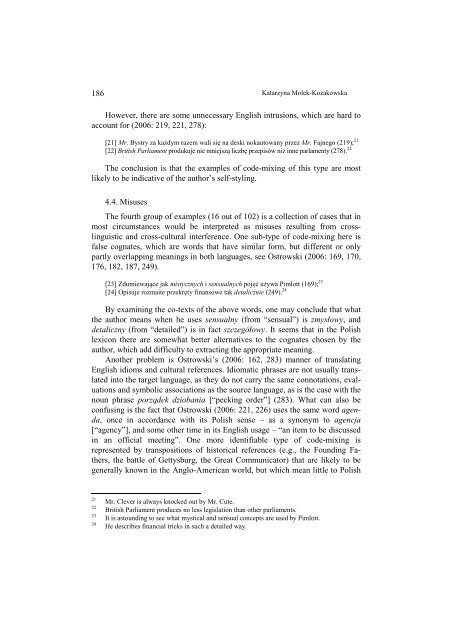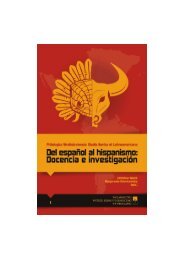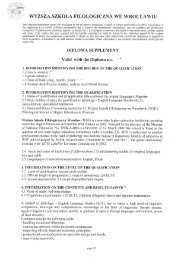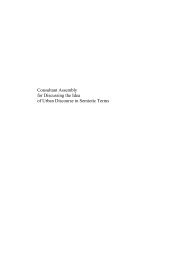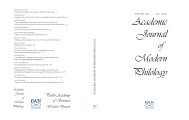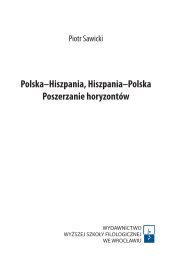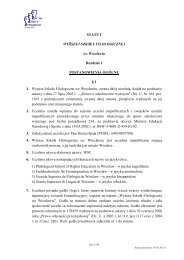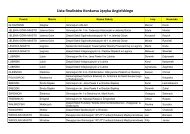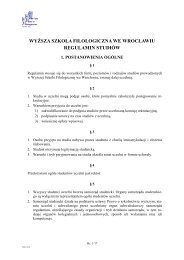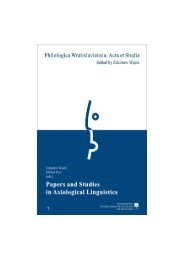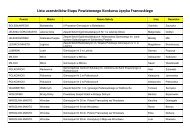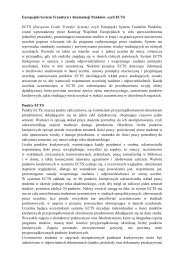s - Wyższa SzkoÅa Filologiczna we WrocÅawiu
s - Wyższa SzkoÅa Filologiczna we WrocÅawiu
s - Wyższa SzkoÅa Filologiczna we WrocÅawiu
Create successful ePaper yourself
Turn your PDF publications into a flip-book with our unique Google optimized e-Paper software.
186<br />
Katarzyna Molek-Kozakowska<br />
Ho<strong>we</strong>ver, there are some unnecessary English intrusions, which are hard to<br />
account for (2006: 219, 221, 278):<br />
[21] Mr. Bystry za każdym razem wali się na deski nokautowany przez Mr. Fajnego (219); 21<br />
[22] British Parliament produkuje nie mniejszą liczbę przepisów niż inne parlamenty (278). 22<br />
The conclusion is that the examples of code-mixing of this type are most<br />
likely to be indicative of the author’s self-styling.<br />
4.4. Misuses<br />
The fourth group of examples (16 out of 102) is a collection of cases that in<br />
most circumstances would be interpreted as misuses resulting from crosslinguistic<br />
and cross-cultural interference. One sub-type of code-mixing here is<br />
false cognates, which are words that have similar form, but different or only<br />
partly overlapping meanings in both languages, see Ostrowski (2006: 169, 170,<br />
176, 182, 187, 249).<br />
[23] Zdumiewające jak mistycznych i sensualnych pojęć używa Pimlott (169); 23<br />
[24] Opisuje rozmaite przekręty finanso<strong>we</strong> tak detalicznie (249). 24<br />
By examining the co-texts of the above words, one may conclude that what<br />
the author means when he uses sensualny (from “sensual”) is zmysłowy, and<br />
detaliczny (from “detailed”) is in fact szczegółowy. It seems that in the Polish<br />
lexicon there are somewhat better alternatives to the cognates chosen by the<br />
author, which add difficulty to extracting the appropriate meaning.<br />
Another problem is Ostrowski’s (2006: 162, 283) manner of translating<br />
English idioms and cultural references. Idiomatic phrases are not usually translated<br />
into the target language, as they do not carry the same connotations, evaluations<br />
and symbolic associations as the source language, as is the case with the<br />
noun phrase porządek dziobania [“pecking order”] (283). What can also be<br />
confusing is the fact that Ostrowski (2006: 221, 226) uses the same word agenda,<br />
once in accordance with its Polish sense – as a synonym to agencja<br />
[“agency”], and some other time in its English usage – “an item to be discussed<br />
in an official meeting”. One more identifiable type of code-mixing is<br />
represented by transpositions of historical references (e.g., the Founding Fathers,<br />
the battle of Gettysburg, the Great Communicator) that are likely to be<br />
generally known in the Anglo-American world, but which mean little to Polish<br />
21<br />
22<br />
23<br />
24<br />
Mr. Clever is always knocked out by Mr. Cute.<br />
British Parliament produces no less legislation than other parliaments.<br />
It is astounding to see what mystical and sensual concepts are used by Pimlott.<br />
He describes financial tricks in such a detailed way.


